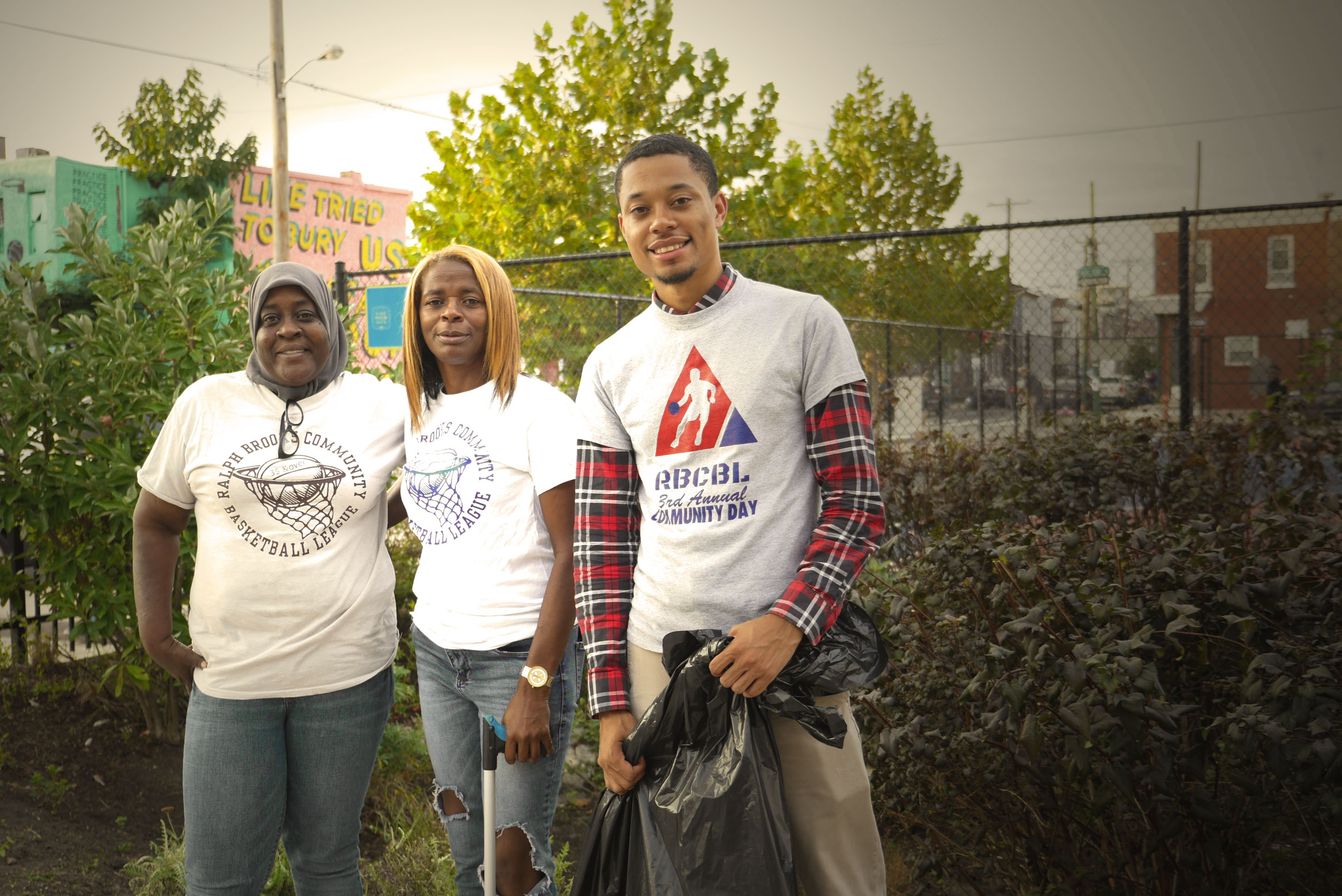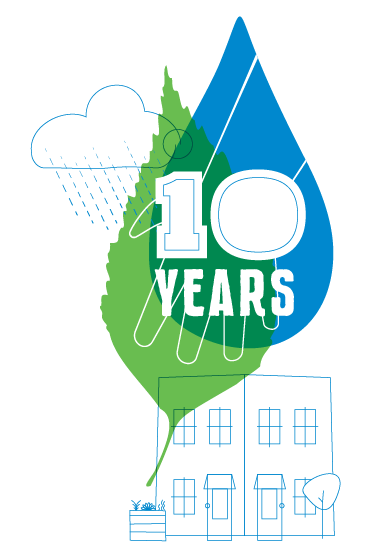 In continuing to celebrate 10 years of Green City, Clean Waters in the Community, it’s pivotal we spotlight residents who contribute to the reduction of local waterway pollution — even in their own back yards.
In continuing to celebrate 10 years of Green City, Clean Waters in the Community, it’s pivotal we spotlight residents who contribute to the reduction of local waterway pollution — even in their own back yards.
In fulfilling our mission of community engagement, the genesis of Green City, Clean Waters included plans for residential-based initiatives.
From working with partners who integrated green tools into home repairs to recruiting communities to adopt green stormwater infrastructure sites, the Water Department knew it was essential for Philadelphians to play a role in the colossal 25-year mission of Green City, Clean Waters.
Today’s popular programs that resulted include Rain Check, designed to encourage homeowners to install landscape improvements that manage stormwater, and Soak It Up Adoption, created to incentivize local organizations to maintain and engage around local green stormwater infrastructure.
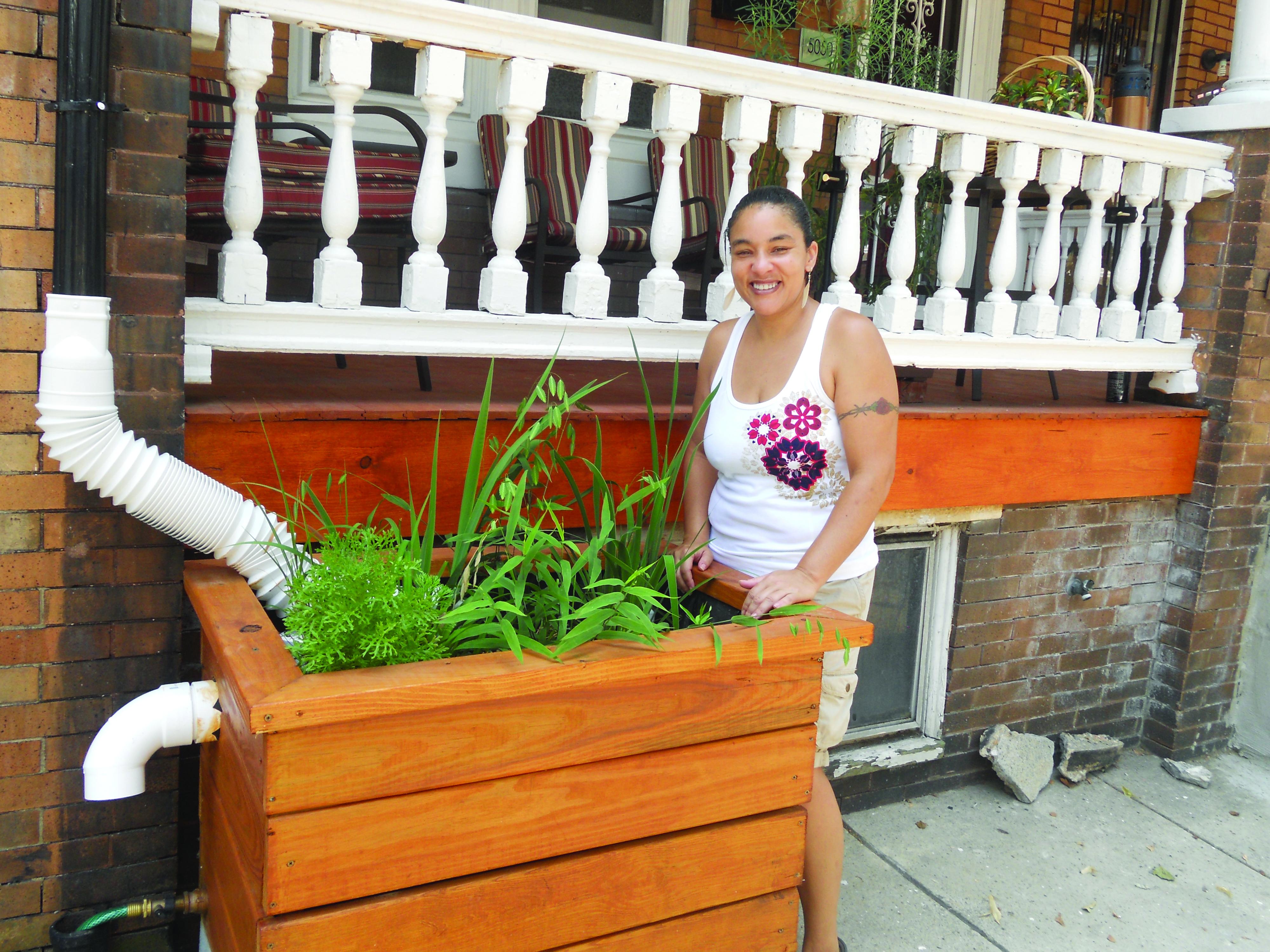
A Philadelphia resident enjoys her wooden Downspout Planter from Rain Check during the first year of the program, in 2011.
Both programs have collectively inspired nearly 13,000 individuals from around the city to beautify communities while helping to protect rivers and streams. They also fuel local environmental, economic, and social advantages: the trifecta of the Green City, Clean Waters Triple Bottom Line pursuit!
“The best moments are when behavioral changes result from our PWD initiatives,” says Tiffany Ledesma, Public Engagement Team manager. “There have been many instances when a customer will say, ‘I’m recycling more, thanks to the information I learned when I received the free rain barrel from PWD!’ When we can create positive ripple effects, starting with stormwater runoff, that’s always inspiring!”

Rain Check
Rain Check started as a pilot program in 2012 as a direct response to community requests for a residential stormwater program in the 2009 rate case process. Prior to establishing Rain Check, the Philadelphia Water Department instituted a free rain barrel program in 2006. In 2015 we consolidated the two programs into one, called Rain Check, and began requiring attendance at workshops for all participants.
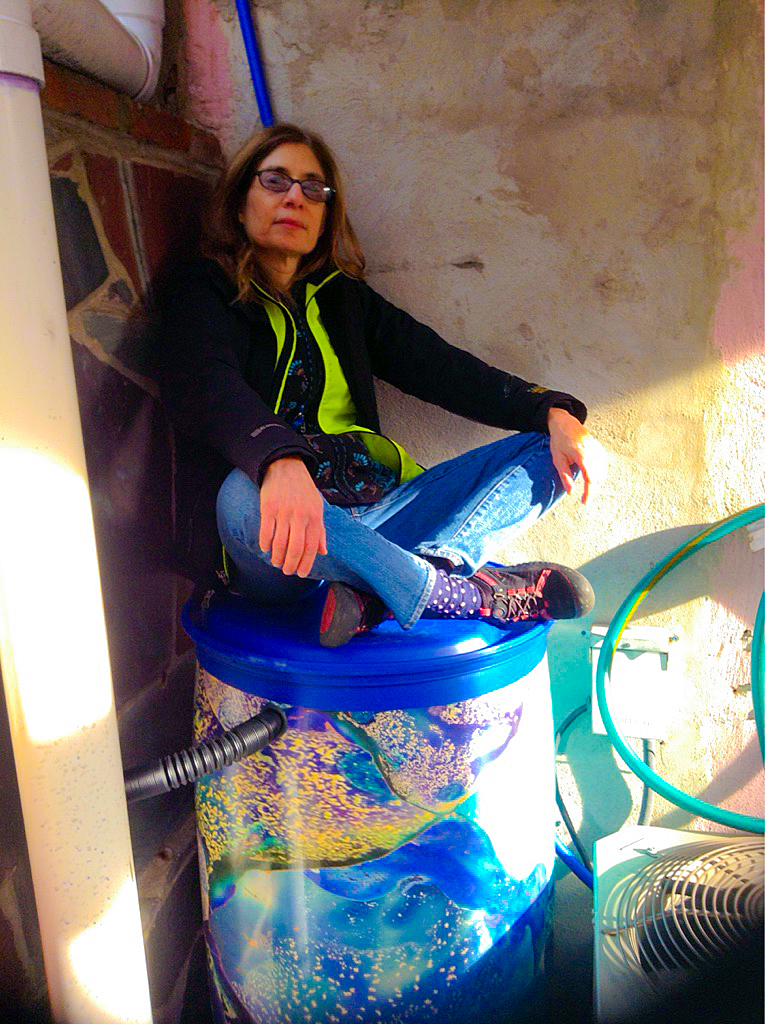
The winner of a 2017 November raffle for a free wrapped rain barrel, designed by Philly students and Mural Arts Philadelphia.
From the beginning, PWD worked with local organizations to administer Rain Check, starting with the Environmental Conservation Association (ECA) in 2012. Two years later, Pennsylvania Horticultural Center (PHS) began managing it, catapulting the program to popularity today.
“The enthusiasm of Philadelphia residents to reduce stormwater runoff on a residential level has been inspirational,” says PWD’s Rain Check’s Manager, Jeanne Waldowski.
During heavy rainstorms, substantial volumes of runoff from impervious surfaces, including rooftops and homes, can overwhelm the City’s combined sewer systems, propelling untreated water spoiled with dilute sewage, dirt, oil, and litter into local waterways, including the Delaware and Schuylkill Rivers.
The average Philadelphia rowhome rooftop’s size is about 800 square feet. When one inch of rain falls on this surface roughly 450 gallons of water is generated, which is enough to fill 8 rain barrels — a free stormwater tool offered through Rain Check. (Rain barrels even provide a wellspring of handy H2O for watering flowering plants, cleaning patios, or washing cars — to name a few.)
“Since we live so close to the Schuylkill River, and it’s a drinking water source for Philadelphia, we wanted to be more responsible with our runoff,” says Fairmount resident Kate McQuade, who received a rain barrel. “The free rain barrel program seemed like a really good deal.”
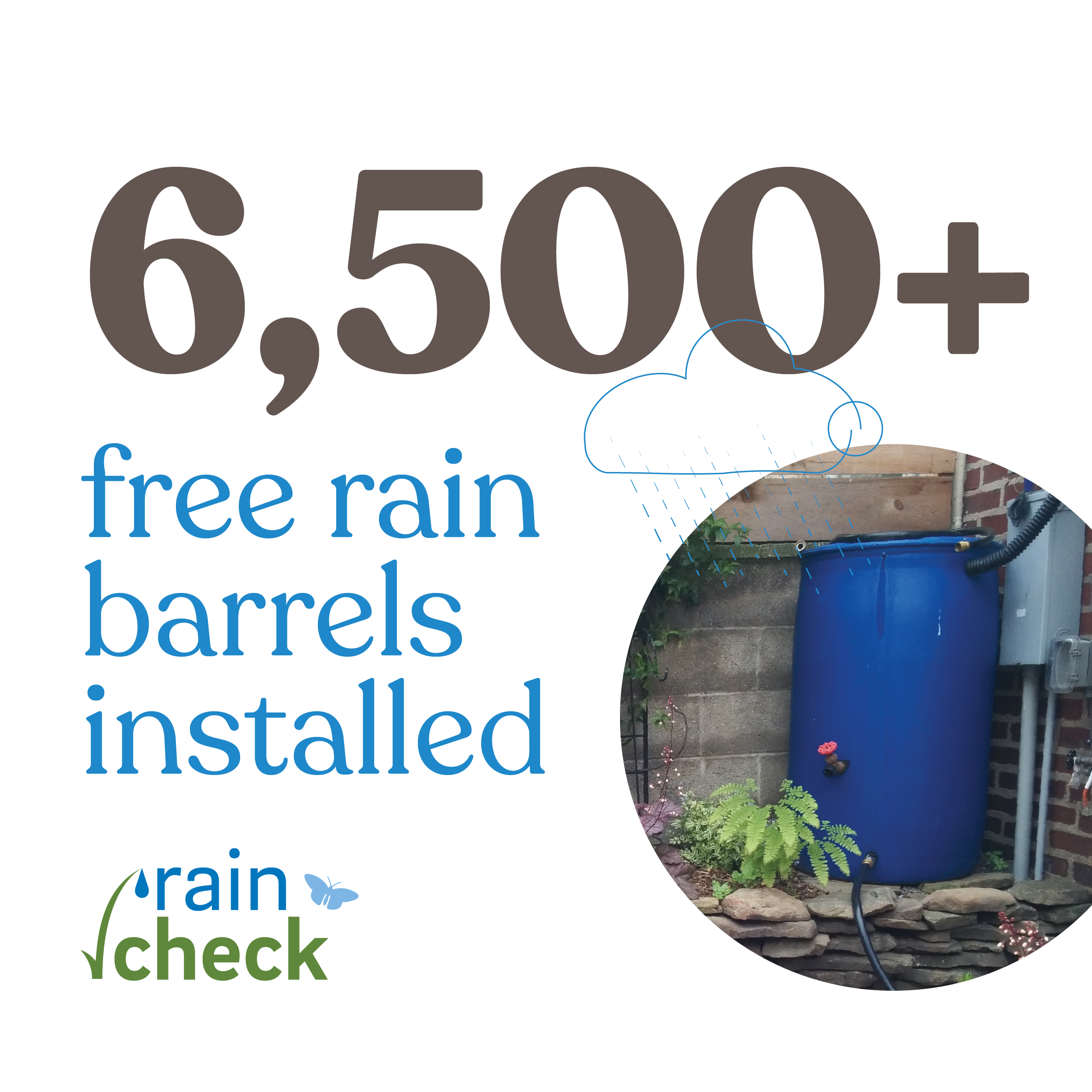
During the past decade, Rain Check has educated close to 8,500 property owners about stormwater management and installed more than 6,500 free rain barrels and just over 1,200 subsidized tools throughout Philadelphia.
The model created for Rain Check begins with participants attending workshops to learn about stormwater management. (Prior to the pandemic, dozens of workshops were held every year in locations across the city.) In order to maximize impact and effect change, workshop attendees learn how they can make a difference with stormwater tools.
During the first eight years of the program, customers were regularly pleased. Surveys revealed that after workshops, 87% of participants said the overall experience was “excellent” and 92% said the educational component was “very effective.”
“It’s been fascinating for me to learn how we’re treating our water and the steps that the Water Department is taking to keep stormwater out of the drains and out of our sewers,” Port Richmond resident Jon Defibaugh, who received a rain barrel. “…It doesn’t cost us anything either, so it was a no-brainer.”

Rain Check helped this Philadelphia resident upgrade her yard with permeable pavers.
After the workshops, residents decide on which stormwater tools are most suitable for them, depending upon the size of their home, landscaping needs, and budget. Systems such as rain barrels, metal downspouts planters, permeable pavers, and rain gardens, are customized to properties and installed by local landscape contractors.
Customer feedback also demonstrated that 82% of residents were “very satisfied” with the installation process and contractors.
“The whole [Rain Check] process was pretty easy…,” says Pennsport resident Valerie Keller, who had a downspout planter installed on her property. “I know some of the problems that the city has with stormwater runoff and overflow and flooding. And, I know that these stormwater infrastructures can help out with that, so I wanted to do something to help.”
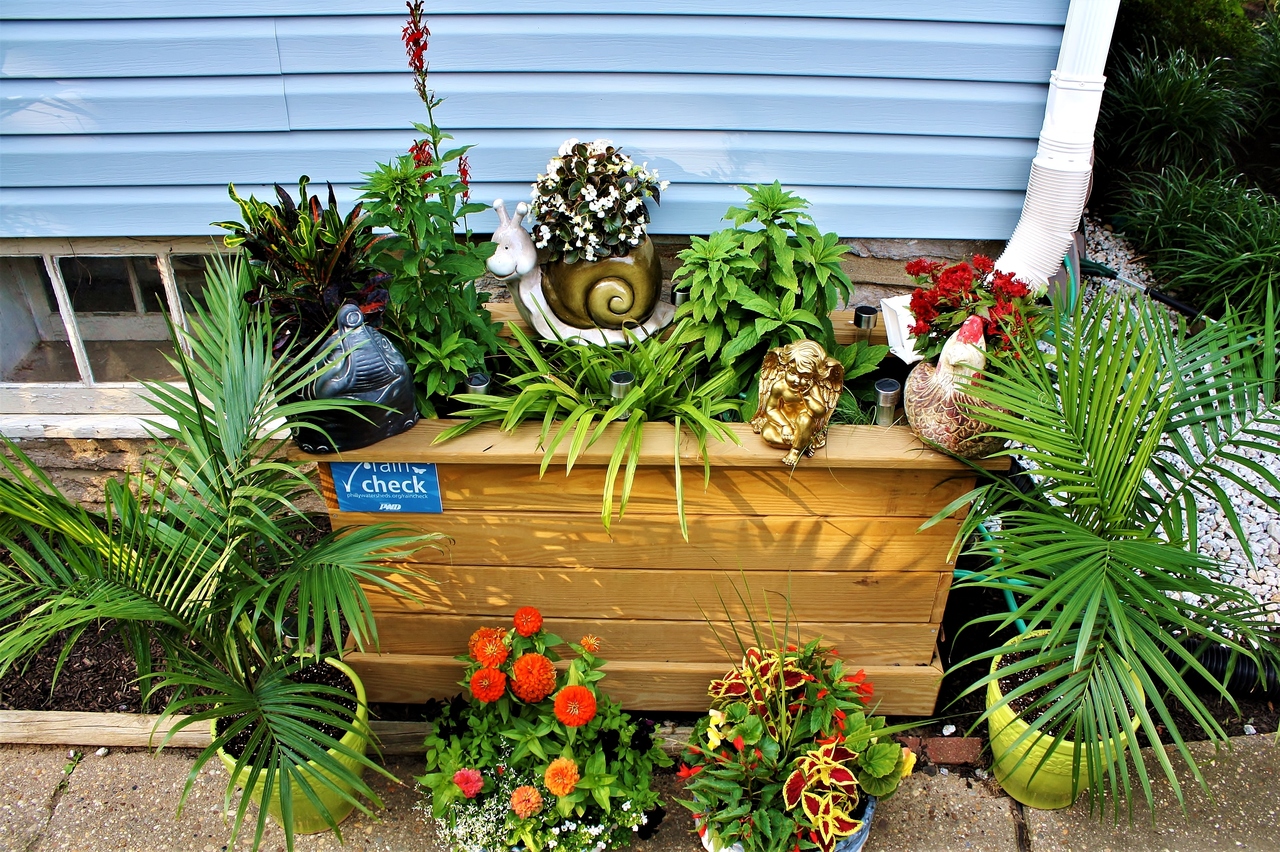
A decorative wood downspout planter from Rain Check
Rain Check has stimulated significant economic gains, as well. Since its inception, it has spurred green jobs, as 15 local companies representing over 40 individuals have enhanced their business with part-time stormwater management work through Rain Check.
“Grass is pretty dead ecologically. I’d much rather have a bush that attracts butterflies or provides some berries for the birds and the attraction — the ability — to talk to our neighbors who stop and go, ‘Wow, that’s really pretty,’” says homeowner CJ Hazell, who installed a rain barrel and rain garden on her East Falls property. “That's all exciting. It makes the whole neighborhood look nicer…We probably would not have been able to do this if it hadn’t been for the Rain Check Program. I really love what Philadelphia Water is doing. I think it’s fantastic.”
Green City, Clean Waters, Residential: 10 years Supporting You and Your Neighbors from Philadelphia Water Department on Vimeo.

Soak It Up Adoption
Around the same time Rain Check made a splash, our Soak It Up Adoption program started taking root. It was conceived to involve community members in the caring of constructed green stormwater infrastructure.
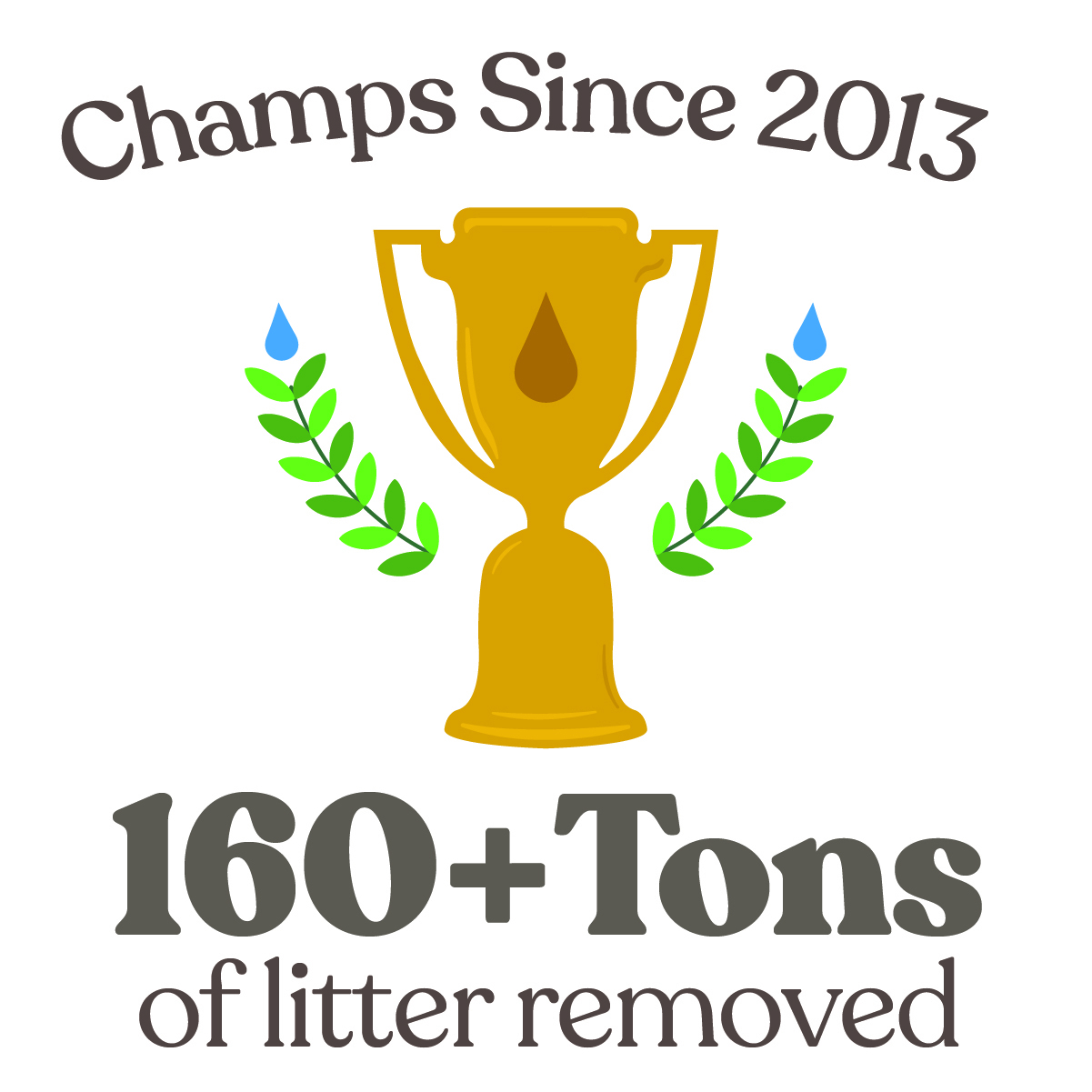
It all started with Christopher Columbus Charter Middle School students during the installation of the City’s first green street at Columbus Square in South Philadelphia. The Water Department taught the students about soil science and the water cycle. The students were motivated to adopt the stormwater planters on the street, helping to protect them from litter and watering the vegetation. These interactions helped the Water Department create a framework that translated to the NorthEast Treatment Center where patients adopted the City’s first green parking lot on Eadom Street.
These early experiences shaped what we now call Soak It Up Adoption. The program was established in collaboration with the Pennsylvania Environmental Council, which had been exploring new community capacity-building models.
Soak It Up Adoption creates capacity-building with mini-grants from the Water Department, allowing community members to become ambassadors of Green City, Clean Waters while helping to maintain the beauty of the above-ground vegetation that manages runoff.
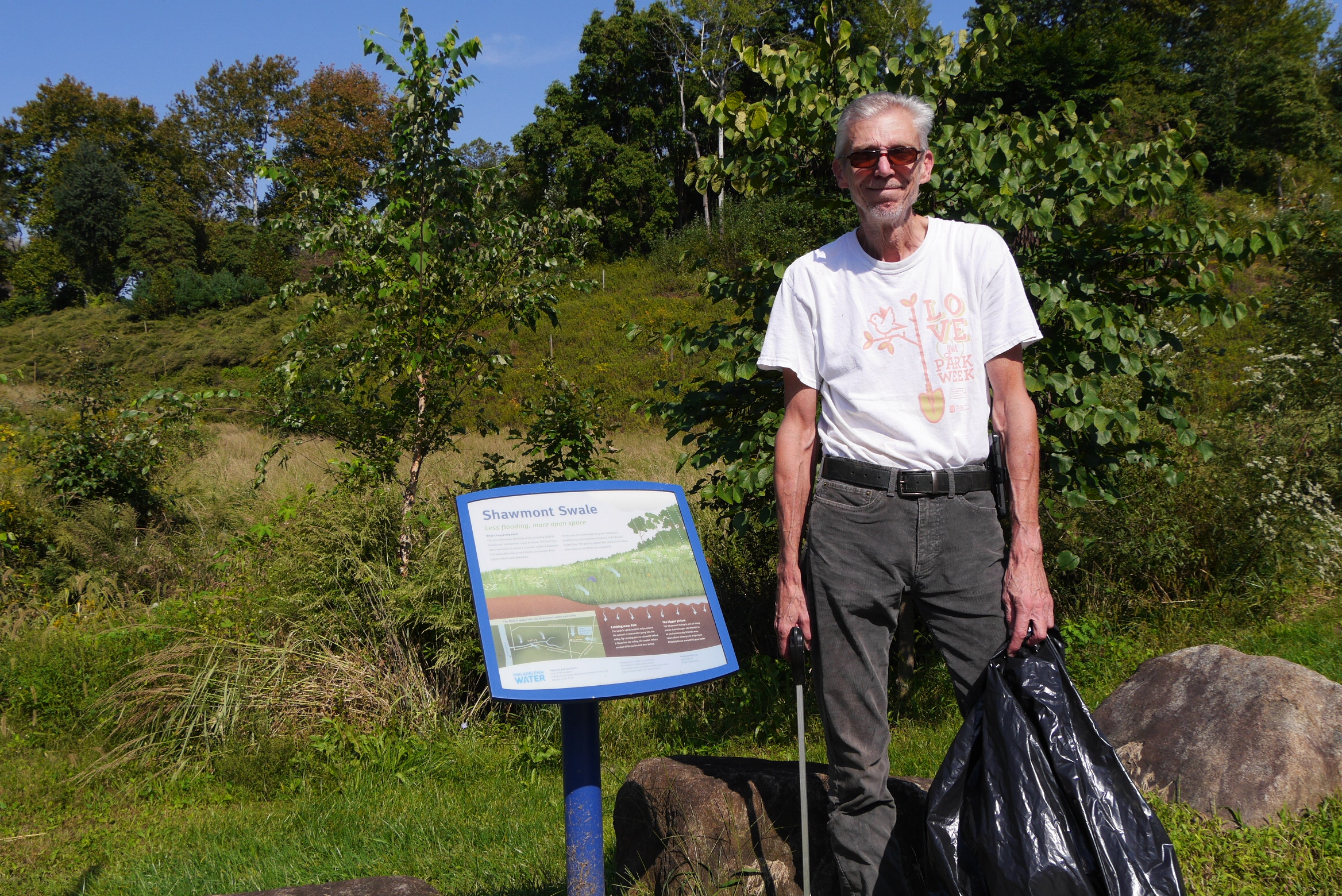
A Soak It Up Adoption participant helps keep a swale at the Upper Roxborough Reservoir site free of litter.
As local caretakers to these green tools, such as rain gardens or bumpouts, the Adoption partners help support PWD’s maintenance teams by visiting sites weekly, advocating for neighborhood beautification, and engaging residents around stormwater management projects. All of our green stormwater infrastructure sites, regardless of their Adoption status, receive regularly scheduled maintenance, ranging from top-side landscape care to subsurface high-pressure clean-outs, for their entire operating life cycle.
“We love the working relationships we have with community organizations around green stormwater infrastructure sites in their neighborhood,” says Soak It Up Adoption manager and outreach specialist Dan Schupsky. “By building a program centered on their feedback, we’re able to design it in a way that is impactful and sustainable. Relying on these ‘green heroes’ to help us maintain green tools and engage their neighbors creates trust and beautifies the city. I’d like to thank each and every partner for their hard work, especially throughout the pandemic.”
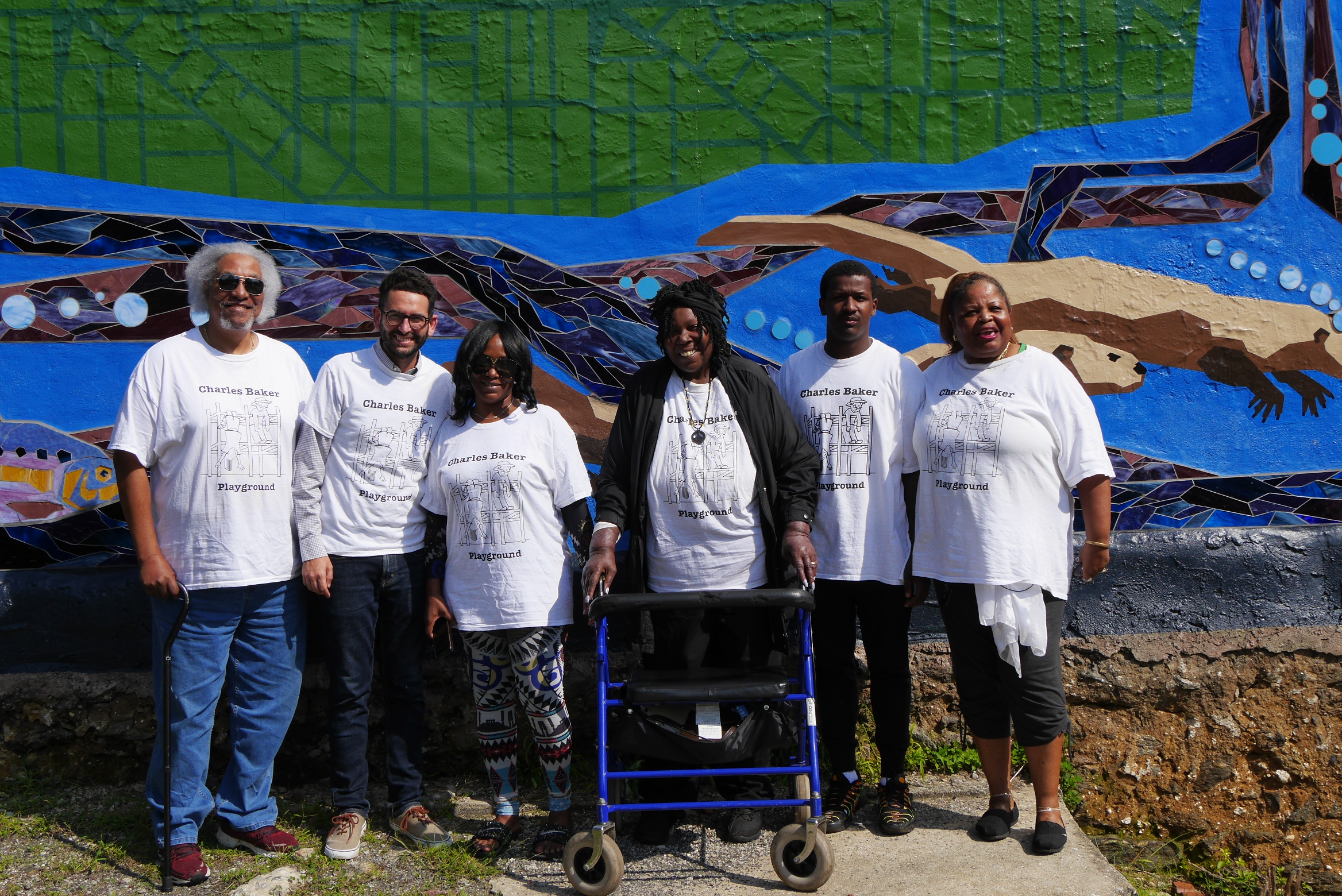
Philadelphia Parks Alliance is one of the organizations that have adopted several GSI sites in the Hestonville neighborhood.
These ‘green’-driven groups, who must maintain a 501(c)3 status, receive annual mini-grants to clean green stormwater infrastructure sites and engage neighbors around them. These funds, which average approximately $4,500 annually per group, elevate hyper-local needs and amplify the ability to make a difference.
Responsibilities include ensuring that sites are litter-free, curb lines are clear of trash, and inlet surfaces are unobstructed. Beyond assisting with aesthetics, partners contribute to the Water Department’s community engagement cornerstone by presenting info about the sites at meetings, writing articles for local newsletters, or organizing neighborhood cleanups — to name a few.
“It’s about taking care of your neighborhood, taking ownership of the environment around you,” says Adoption partner Leon Sanford of Asociación Puertorriqueños en Marcha (APM). “And, sometimes if you just take the initiative, you’ll be surprised about how people will tag along with you. One person can make a difference.”

A Soak It Up Adoption participant maintains bumpouts on Queen Lane in Germantown.
In 2019 alone, Adoption partners collected over 38,000 pounds of litter from more than 100 sites during weekly visits that helped employ 50+ Philly residents and engaged more than 5,300 neighbors. Altogether, they used nearly $70,000 to purchase materials and hire individuals to positively impact their communities.
As Tracey Anderson, Ralph Brooks Community Basketball League member, says in our favorite Adoption video to date, “It’s not just good for the water, this beautifies our community.”
Well done, and well said!
Green City, Clean Waters, Soak it Up Adoption: 10 years Supporting You and Your Neighbors from Philadelphia Water Department on Vimeo.

Become a Green Champion…
…By receiving funds to nurture your neighborhood.
Soak It Up Adoption program coordinator Dan Schupsky poses with a group of participants
Join a small but mighty group of a dozen dedicated organizations that comprise the Adoption family. The program is accepting applications over the next few months.
As a partner, you’d not only spruce up your community and help to eliminate water pollution, but you’d also be hiring to support a local green economy! (Not convinced yet? Read even more about the advantages of joining Soak It Up Adoption!)
To start, review the FAQ, and then request an application.
While your submission is pending, check out the Big Green Map, and find constructed green infrastructure to possibly adopt in your organization's boundaries!
(Good news! Once you join our team, you can renew your grant on an annual basis!)
…Or right at your doorstep!
To get started, answer questions about your property to find out which stormwater tools you could get installed with the help of Rain Check.
Take the Rain Check Assessment!
All Rain Check workshops are being held virtually.
Due to demand in interest, we are experiencing an extremely large waitlist for these workshops.
Please pre-register, but be aware that you may not be notified about upcoming workshops for a couple of months.
